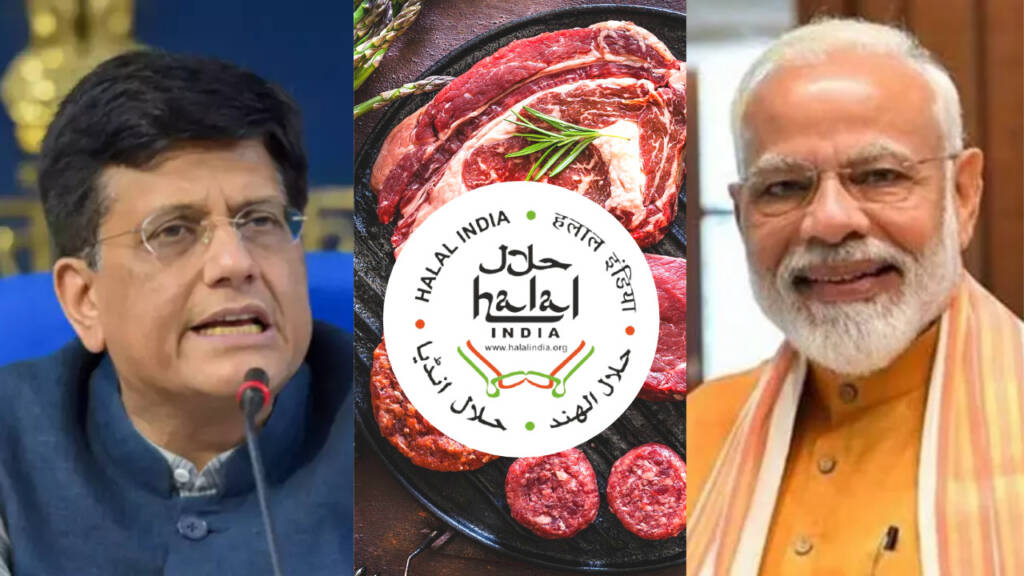Agricultural and Processed Food Products Export Development Authority (APEDA), the apex body for the promotion of agricultural export, has removed the word ‘Halal’ from its Red Meat Manual. Previously Upword, a not-for-profit knowledge platform raised the issue with the Ministry of Commerce of Industry’s Red Meat Manual which has prescribed ‘Halal’ meat for exports.
“All animals must be slaughtered by Halal method in the presence of holy men approved by the Jamiat Ulema-e-Hind as per Islamic Shariyat, for certification,” tweeted Upword.
APEDA was quick to clarify that there is no such condition imposed by the Government of India but it is a requirement of the majority of the importing countries. The agency further clarified that the certification is not issued by the Government of India but these agencies are accredited directly by the importing countries.
However, now the government has deleted the word ‘Halal’ altogether from the Red Meat Manual. “We thank the govt for taking our constructive criticism seriously and removing portions from the APEDA’s Med Meat Manual that endorsed the halal method. Such responsiveness goes a long way in building trust and strengthens the nation. Really appreciate it,” tweeted Upword, the organisation that had raised the issue, thanking APEDA and Union Minister Piyush Goyal.
We thank the govt for taking our constructive criticism seriously and removing portions from the APEDA red meat manual that endorsed the Halal method. Such responsiveness goes a long way in building trust and strengthens the nation. Really appreciate it.
cc: @PiyushGoyalOffc pic.twitter.com/pxtD8oeuRH
— Upword (@upword_) January 4, 2021
With a halal prescription, the Hindu and Sikh communities which deploy “Jhatka’ method to slaughter animals for meat, can sell meat in India, if not export to Islamic countries as the meat slaughtered by non-Muslim communities is not considered halal.
Religious certification of food products is becoming a big issue in India, as extremist Muslims had been monopolising the regulation of non-vegetarian, as well as, vegetarian food through the halal certification. Even companies like Patanjali were forced to take halal certification from various Muslims certification bodies, which charge hefty money ranging from 500 rupees to 5,000 rupees per food product.
Previously, multinational fast-food chain McDonald’s was caught in a fix after the company had declared that they only serve Islamic halal-certified foods in India. This declaration, coming from the food chain, had unsettled consumers from several communities who either had reservations against the painful and inherently exclusionist halal technique or had other religious compulsions.
According to a study by Adroit Market research, the global halal market is worth more than 4.54 trillion dollars. To give a comparison, this is more than the GDP of Germany, India or the United Kingdom. By 2025, the global halal meat industry is expected to touch 9.71 trillion dollars with a monopoly of Muslims over it.
As per Food Standards Agency of United Kingdom, “51 per cent of lamb, 31 per cent of chicken, and 7 per cent of beef slaughtered in Britain – from a total of 16 million animals per week – is now ‘religiously killed’, which is way more than total Muslim population of the country which is only 5 per cent.”
The halal meat industry is ‘of the Muslims, by the Muslims but for everyone’. In countries around the world including the United States, the United Kingdom, and India, the tiny Muslims minority has forced the majority community to adhere to their practices and standards.
The Muslim community has already monopolised the non-vegetarian food industry and forced lower caste and lower class of Hindus to go unemployed. As even vegetarian food units are being asked to get the halal certification if they want a smooth run without a boycott from Muslims, despite the fact, all vegetarian food is halal (pure) as per Quran. In a country where a majority of consumers are non-Muslims, Halal food is being forced down their throat, thanks to cartelisation, fundamentalism, and unity of Muslims.
